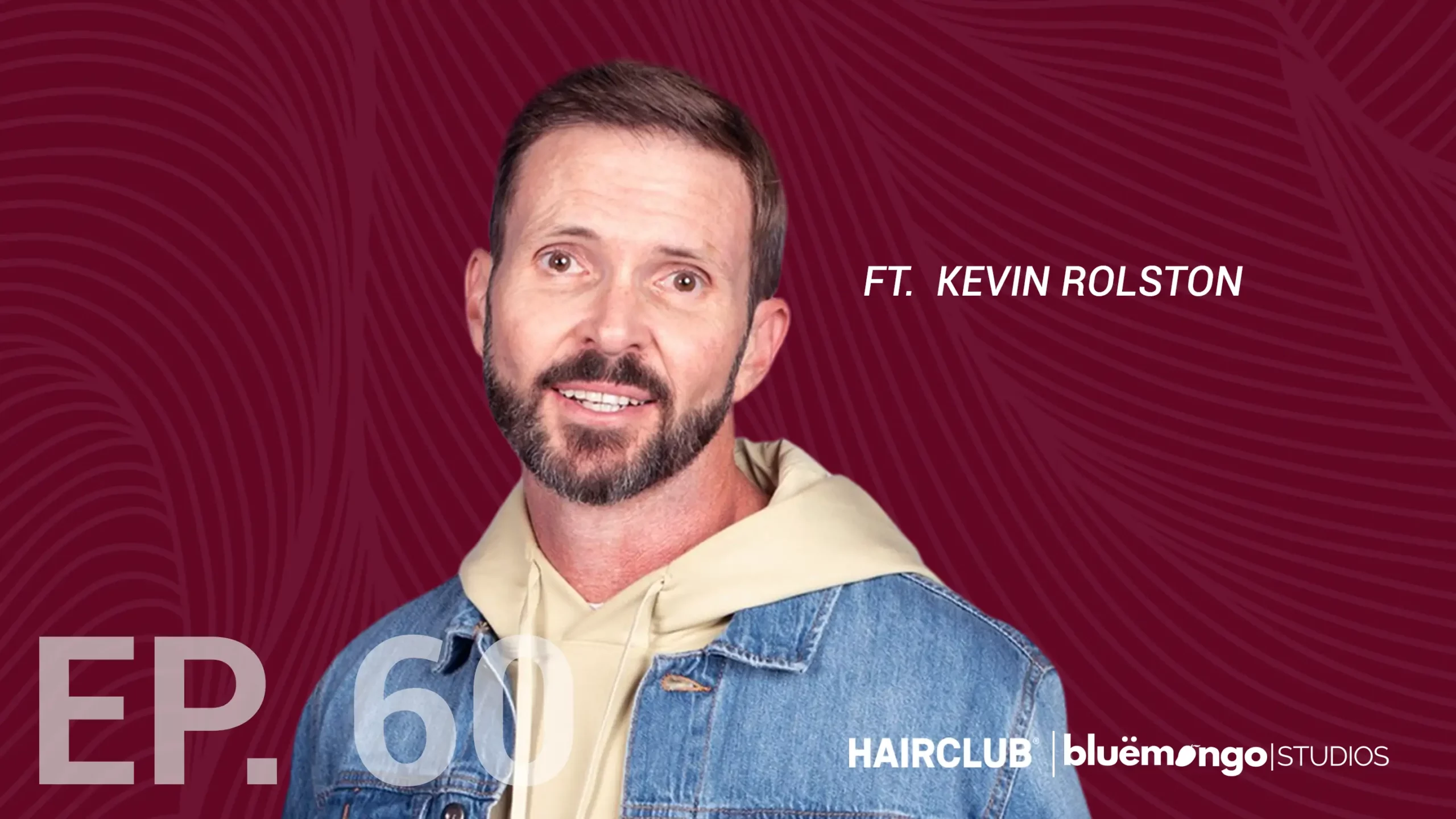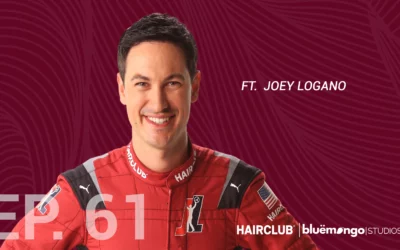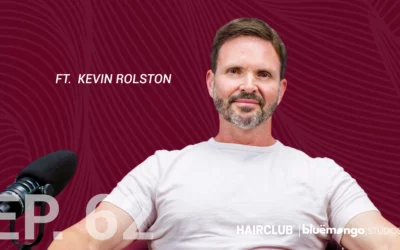Kevin Rolston [00:00:02]:
One thing you gotta watch out for too, when it comes to your hair health is your stress levels. Now, working out can reduce stress and it’s great for it. Stress is something that throws your body out of balance. And as we’ve discussed, when your body is thrown out of balance, it affects your hair health. So things like meditation, relaxation, things that reduce your stress levels are all underrated tools for both fitness and hair health. Welcome to hairpod, the podcast where you get to hear real people talk about their hair journeys. I’m your host, Kevin Raulston, and each week I get to interview people from different walks of life whose lives have been touched by hair loss in some form or fashion. Many of our guests have experienced hair loss themselves and found a way to get their confidence and their hair back.
Kevin Rolston [00:01:01]:
Hosting this show has been one of the most eye openening experiences of my life. I’ve learned just how connected hair is to our identity, our confidence, and even to our emotional well being. And what’s been even more inspiring is seeing the many different ways people are taking control of their hair health, whether through lifestyle changes, treatments, or community support. Now, here’s a question. Can something as simple as your protein shake be contributing to hair loss? That’s what we’re diving into today. Did you know that nearly 58% of gym goers use dietary supplements regularly? And that number shoots even higher amongst men under 40. With fitness becoming such a big part of everyday life, more people than ever are taking supplements like protein powders, creatine, pre workouts, and even testosterone boosters. But what many people don’t realize is that some of these products, while helpful for gains, could be working against you when it comes to hair growth.
Kevin Rolston [00:02:00]:
In this episode, we’re talking about how fitness and health supplements may affect your hair. We’ll explore the science behind the connection, which products might be worth a second look, and most importantly, what you can do to protect your gains and your hairline. Now, look, I understand what the game is all about. You know, when you’re working out, you want to get the most gains that you possibly can. You’re going through all that pain in the gym. Look, I’ve been there many, many times and I started off simple like a lot of people do. Maybe you take some creatine or you hear about a protein powder or some kind of pre workout. That’s supposed to be the thing.
Kevin Rolston [00:02:38]:
And you know you want to do it because you want to get the biggest gains that you can. And as you do that, you may see a little bit of results, but it may not be exactly what you want. And that’s where people start going a little bit further and a little bit further and a little bit further until maybe you get to testosterone boosters. And this is where we have an issue, because there are direct links to testosterone into what it does to your hair follicles, creating something called DHT that actually kind of chokes off the hair follicles. So if you supplement too much testosterone in your body, then you can start to notice some of these issues. In fact, for me, what really started to escalate my hair loss was when I really got into working out. Sure, I was seeing massive gains. My muscles are getting huge.
Kevin Rolston [00:03:22]:
It’s great. But it was the most rapid period of hair loss for me in my entire life. And that’s when I realized, okay, I got to do something about this. Now, I don’t know how much of my hair loss was due to the creatine or the protein powders or anything like that. I wouldn’t think there’d be anything there. To me, what became suspect was when I really got into focusing on testosterone. I was in a situation where I was working out really hard, had been for about 18 months, and I wasn’t really seeing any kind of gains whatsoever. In the gym, my trainer said, I bet you have low testosterone.
Kevin Rolston [00:03:56]:
So I went in, I got my hormone levels tested, and yeah, sure enough, I had really low testosterone. So I got on treatments, and I noticed so much how much stronger I got almost immediately. And six weeks later, my body had transformed itself, and I was so into looking at my pecs and my chest and my glutes and biceps, triceps, all that kind of stuff. I didn’t really notice that my hair loss was really starting to escalate. Now, the one thing I will tell you, because I am back doing the hormone replacement therapy right now, is it does make you feel better. And there’s so many benefits for it. It gives you more energy, kind of gives you that oomph that you want, and it helps to alleviate brain fog. Just a few things.
Kevin Rolston [00:04:39]:
You’re also going to have the physical ones as well, where it’ll, you know, shred you up a little bit, and you will start putting on the lean muscle. So I’m not saying to not do it, because clearly I am, but you just need to make sure that your levels are right. And you also want to go on ahead and talk to your trainer or whoever getting your supplements from. And I’m hoping that you’re doing it under a doctor supervision. That is actually the way to actually do it. But you also might want to find out from your hair stylist or if you’re going to hair club like I am, talk to them about exactly what effects your testosterone treatments could be having on your hair loss and what you need to do about that. For some of you, it may be an either or type thing and you just may have to decide what is more important to you to get really big and super jacked at the expense of your hair or maybe do other supplements or things like that that won’t be as effective. So maybe you say, okay, I’ll just overload on whey protein.
Kevin Rolston [00:05:32]:
Well, before you do that, you got to know that too much whey protein isolate, especially in low quality, can sometimes spike your insulin or affect your hormone levels as well. So even though you’re not doing the testosterone, there are other things you can do that could still increase that testosterone and creating the DHT and then causing the hair loss that you absolutely don’t want. That’s why to me, these two things really need to work together in concert. Now, another thing that people are going to do when it comes to working out, extreme diets or caloric deficits that you want to do, especially if you’ve got some kind of weightlifting show or it is beach or pool season and you just want to look great, maybe you’ve got a wedding that is coming up. You need to know that just throwing your body out of whack, even by trying to shred up, could also accelerate your hair loss. Now, the one thing that I thought was a little bit surprising, there are some studies out there that link creatine to potential increases in dht. Again, DHT is what we’re talking about here that is such an enemy to your hair follicles and is something that really spurs on the hair loss. Now, the evidence is mixed, but it’s definitely something worth looking at.
Kevin Rolston [00:06:53]:
I’ve warned you a little bit about testosterone, we talked a little bit about protein, but creatine is definitely something that’s in that world as well that you might want to look at. And another thing that I know often happens when you’re working out is that you really get into it. Boy, it just that little gain makes you want more and more and more. It’s almost like a drug in and of itself. And even if you’ve not done any supplements, you’re not doing creatine, you’re not doing the protein, you’re not doing the testosterone, just even overstressing anything that you do that is really a drain on the body. Think about that. You know, when you’re talking about recovery, you need to put these supplements back in your body. Maybe you drink a chocolate milk or you’re eating a peanut butter and jelly sandwich, Some of those things that kind of give you that boost.
Kevin Rolston [00:07:36]:
You got to remember that as you are working out, you’re tearing muscle and you’re breaking down your body, and it is all connected. So as you’re breaking down muscles wearing down your body, you got to make sure you get the nutrients, not just for the muscles, but your hair, nails, all that kind of stuff that’s also requiring nutrients. So take that into consideration to make sure that if you are lacking on those kind of things, that you could have some issues and it could increase and accelerate your hair loss. Because a lack of nutrients can lead to telogen effluvium, which is temporary hair shredding due to stress. So make sure you’re doing all the things that you need to do. You’re hydrating, you’re getting the nutrients, you’re properly fueling your body. But most importantly, too, you’re getting the rest and the sleep that you need. Now that we’ve covered some of the things that you could do in the health and fitness world that could accelerate your hair loss, there are some things out there that maybe even somebody has told you will, but here are some of the myths that are out there.
Kevin Rolston [00:08:39]:
Multivitamins, you’re going to be absolutely fine. I mean, again, talking about something that is going to provide nutrients for your body, those are the things that actually will help hair health, not take away from it. And you got to know that not all fitness supplements will cause hair loss. But it is something that I would definitely do a review on to see as you’re picking up that supplement, or before you even order it, making sure that it isn’t something that could be on a list of things that could increase hair loss. Now, some other things that you might see in the workout world, biotin or even collagen, maybe somebody’s told you that that is going to be bad for your hair health. But probably what they’ve done is told you the exact opposite. Because there is some evidence that when taken properly, both biotin and collagen could be good for your hair health. So if you are going to do the supplements and you have found one that you don’t think is going to contribute to excess testosterone and cause hair, One thing that is important, though, choosing quality supplements, you want something that’s going to be clean Something that’s going to be balanced.
Kevin Rolston [00:09:41]:
You want to look for supplements that are free from artificial hormones or questionable fillers. And many people think that they need to take all these protein powders and things like that. But you know, a lot of times if you just have a protein rich diet and you’re getting all the nutrients that you need, sometimes that might be all it takes to fuel your body. Buying these expensive supplements and protein powders may not even be necessary for what you’re trying to accomplish. And something you’ll also want to consider if you’re working out a lot and you’re sweating sometimes you may be taking excessive showers or more than you would if you weren’t working out. You could be doing two a day, possibly. So with that, you’ve got to keep in mind your scalp health. When you’re talking about hair loss, there are some shampoos that are just not going to be good for.
Kevin Rolston [00:10:26]:
So make sure you’ve got a good quality shampoo that actually could not be contributing to your hair loss. And as a positive, there are actually some shampoos that are out there that could help reduce DHT on the scalp. You might also want to look into some serums or some other treatments that could also be effective in reducing dht. Now, if you are showering more often because you are going to the gym, you want to probably add some things into your usual routine with shampoo and conditioner to help your hair health. There are some supplements that are out there or even shampoos that may have some key ingredients you’ll want to look out for. Saw palmetto is great pumpkin seed oil, marine collagen, biotin, which I just mentioned. Zinc or even vitamin D is going to be good for your hair health. Now we talked about how important sleep is too to recovery.
Kevin Rolston [00:11:20]:
But one thing you gotta watch out for too when it comes to your hair health is your stress levels. Now, working out can reduce stress and it’s great for it. But sometimes taking that time out of your day might make your schedule a little bit tighter, thus adding more stress to your life. Stress is something that throws your body out of balance. And as we’ve discussed, when your body is thrown out of balance, it affects your hair health. So things like meditation, relaxation, things that reduce your stress levels are all underrated tools for both fitness and hair health. And if there’s ever anything that you have a question about, that’s why I love having a consultant, somebody I can get a hold of, that I trust. And that’s why hair club is a great resource for that.
Kevin Rolston [00:12:05]:
Talking to one of their hair health assistants can give you the information and perspective you need to make all the right decisions so you can do the best for your body and also for your hair. If you’re dealing with hair loss and unsure if your supplement stack might be part of the problem, just reach out because Hairclub would love to help@hairclub.com thanks for tuning in to another episode of Hairpod. If today’s conversation about fitness supplements and hair loss got you thinking about your own routine or someone else’s, we’d love it if you would share this episode with them. You never know who might need to hear it. Be sure to follow us on Instagram airclub or search Harepod on Facebook to keep the conversation going. Be sure to follow us on Instagram airclub or search Harepod on Facebook to keep the conversation going. And if you’re enjoying the show, consider leaving us a rating and review on Apple Podcasts or your favorite podcast app. It really helps others find us.
Kevin Rolston [00:13:03]:
You can also check out past episodes, resources and more by visiting our podcast.hairclub.com we’re here to uplift, inform and remind people that they are not alone in their hair loss journey. So if this episode resonated with you, invite a friend to join the Hairpod community because these conversations are always better when they’re shared. Thanks again for listening. Until next time.






